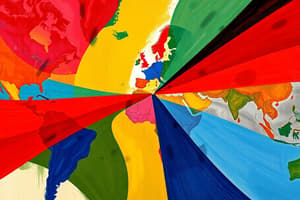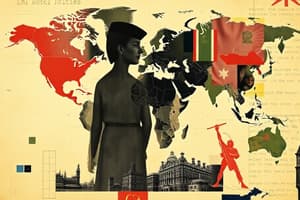Podcast
Questions and Answers
Which concept, arising from the Peace of Westphalia, is most fundamental to the modern international system?
Which concept, arising from the Peace of Westphalia, is most fundamental to the modern international system?
- The principle of collective security through alliances.
- The sovereignty of states within their territories. (correct)
- The balance of power between major states.
- The promotion of free trade and economic interdependence.
According to the realist perspective, what is the primary driver of state behavior in international relations?
According to the realist perspective, what is the primary driver of state behavior in international relations?
- The pursuit of power and security. (correct)
- Cooperation through international organizations.
- Adherence to international laws and norms.
- The promotion of economic interdependence.
How does liberalism contrast with realism in its view of the primary actors in international relations?
How does liberalism contrast with realism in its view of the primary actors in international relations?
- Recognizes individuals, multinational corporations, and international organizations. (correct)
- Focuses exclusively on military alliances.
- Recognizes only the state as an actor.
- Prioritizes the role of international law.
How does constructivism differ from realism and liberalism in explaining the behavior of states?
How does constructivism differ from realism and liberalism in explaining the behavior of states?
How do Marxists view globalization?
How do Marxists view globalization?
What is a key element which differentiates poststructuralism from realism, liberalism and Marxism?
What is a key element which differentiates poststructuralism from realism, liberalism and Marxism?
What is the primary focus of postcolonial approaches in International Relations?
What is the primary focus of postcolonial approaches in International Relations?
Which of the following best describes the concept of 'hegemony' as introduced by Gramsci and applied in international relations by scholars like Robert W. Cox?
Which of the following best describes the concept of 'hegemony' as introduced by Gramsci and applied in international relations by scholars like Robert W. Cox?
Considering Thomas Hobbes' perspective on the state of nature, how would states behave in the international system?
Considering Thomas Hobbes' perspective on the state of nature, how would states behave in the international system?
Liberal internationalism posits which factor reduces international conflict:
Liberal internationalism posits which factor reduces international conflict:
What is the security dilemma, and how does it manifest in international relations?
What is the security dilemma, and how does it manifest in international relations?
Unlike realism or liberalism, what aspect of international relations does Marxism emphasize?
Unlike realism or liberalism, what aspect of international relations does Marxism emphasize?
According to poststructuralism, what is the significance of discourse in world politics?
According to poststructuralism, what is the significance of discourse in world politics?
Which concept is central to understanding the historical context of post-colonial and neo-colonial power dynamics?
Which concept is central to understanding the historical context of post-colonial and neo-colonial power dynamics?
Why is the inside-outside dichotomy essential for Poststructuralists' understanding of global politics?
Why is the inside-outside dichotomy essential for Poststructuralists' understanding of global politics?
How did the end of the Cold War challenge the dominant theories of international relations at the time?
How did the end of the Cold War challenge the dominant theories of international relations at the time?
Why did mainstream Marxist theory experience less support in the landscape of international relations?
Why did mainstream Marxist theory experience less support in the landscape of international relations?
According to social constructivists, what role do identities and interests play in the international arena?
According to social constructivists, what role do identities and interests play in the international arena?
How can the study of international criminal court (ICC) and reluctance of the trump administration to engage with it can be viewed from the liberal point of view?
How can the study of international criminal court (ICC) and reluctance of the trump administration to engage with it can be viewed from the liberal point of view?
What is the function of critical theory according to Robert W. Cox?
What is the function of critical theory according to Robert W. Cox?
Which is an element that distinguishes Social Constructivism from Realism?
Which is an element that distinguishes Social Constructivism from Realism?
What is the core concept presented by Antonio Gramsci? (related to challenges and questions to Marxist theory)
What is the core concept presented by Antonio Gramsci? (related to challenges and questions to Marxist theory)
What does genealogy examine in post structuralism?
What does genealogy examine in post structuralism?
What is the relationship between power and knowledge according to Foucault, as incorporated into poststructuralist thought?
What is the relationship between power and knowledge according to Foucault, as incorporated into poststructuralist thought?
What concept does postcolonialism emphasize?
What concept does postcolonialism emphasize?
Intergovernmental Organizations (IGOs) are MOST associated with the ideas of which framework?
Intergovernmental Organizations (IGOs) are MOST associated with the ideas of which framework?
Some of the key Historical foundations of Realism are:
Some of the key Historical foundations of Realism are:
The idea that the international is constructed by what it is not national, and the national is constructed by what it is not international is related to:
The idea that the international is constructed by what it is not national, and the national is constructed by what it is not international is related to:
The work of what scholar has become synonomous with the idea of cultural vilonce?
The work of what scholar has become synonomous with the idea of cultural vilonce?
Flashcards
International Relations (IR)
International Relations (IR)
A field of study that examines interactions between countries and non-state actors, focusing on diplomacy, trade, security, and ideology.
International Law and Treaties
International Law and Treaties
Formal, legally binding agreements between states.
Intergovernmental Organizations (IGOs)
Intergovernmental Organizations (IGOs)
Organizations involving cooperation between governments of multiple states.
Multinational Corporations (MNCs)
Multinational Corporations (MNCs)
Signup and view all the flashcards
Sovereignty
Sovereignty
Signup and view all the flashcards
State of Nature
State of Nature
Signup and view all the flashcards
Liberal Internationalism
Liberal Internationalism
Signup and view all the flashcards
Democratic Peace Theory
Democratic Peace Theory
Signup and view all the flashcards
Neoliberalism
Neoliberalism
Signup and view all the flashcards
Realism
Realism
Signup and view all the flashcards
Security Dilemma
Security Dilemma
Signup and view all the flashcards
Neorealism
Neorealism
Signup and view all the flashcards
Social Constructivism
Social Constructivism
Signup and view all the flashcards
Norms Lifecycle
Norms Lifecycle
Signup and view all the flashcards
Marxist Theories
Marxist Theories
Signup and view all the flashcards
World Systems Theory
World Systems Theory
Signup and view all the flashcards
Hegemony
Hegemony
Signup and view all the flashcards
Post-Structuralism
Post-Structuralism
Signup and view all the flashcards
Discourse
Discourse
Signup and view all the flashcards
Power & knowledge
Power & knowledge
Signup and view all the flashcards
Deconstruction
Deconstruction
Signup and view all the flashcards
Postcolonial and Decolonial Approaches
Postcolonial and Decolonial Approaches
Signup and view all the flashcards
Neocolonialism
Neocolonialism
Signup and view all the flashcards
Mutual constitution of identities
Mutual constitution of identities
Signup and view all the flashcards
Colonialism as Total Violence
Colonialism as Total Violence
Signup and view all the flashcards
Study Notes
International Relations (IR) Defined
- A multi-faceted field examining interactions between countries and non-state actors on a global scale
- Focuses on formal diplomacy and international cooperation, and informal networks of trade, security, and ideology
- These influence global politics
World Politics
- This is a more expansive term than IR
- Considers more actors, including organizations and institutions
History of IR
- Originates with the establishment of the Department of International Politics at the University of Wales, Aberystwyth in 1919
- Founded post-WWI with the intention of preventing future wars through understanding their causes
- Aims to improve the world through academic study
Challenges to Traditional IR History
- Some scholars argue its roots lie in colonial administration and the study of imperialism
- The Journal of Race Development (1910) justified racial supremacy
- Early IR development was tied to oppressing marginalized groups, excluding African-American scholars
- Other perspectives suggest multifaceted origins emerging from various global contexts
- Ongoing critique addresses the marginalization of women thinkers and founders in IR history
Importance of Historical Context
- Crucial for analyzing world politics effectively
Narrow Sense of IR
- Focuses on sovereign nation-states
- These are political entities with recognized authority over a defined area and population
- Characterized by non-interference from external sources
Focus Areas in the Narrow Sense
- War and Peace: Studies national interactions during conflict and peace
- The mechanisms of diplomacy and conflict avoidance are key
- Examples include military alliances, peace treaties, negotiations, and UN peacekeeping forces
- International Law and Treaties: These are legally binding agreements governing state behavior
- Examples include the UN Charter, arms control, and trade agreements
- Aims to regulate interactions to prevent conflict and encourage cooperation
- Membership in IGOs and Alliances: States participate to promote cooperation, manage conflicts, and enhance security
- Examples of organizations include the UN, NATO, African Union (AU), and European Union (EU)
- Diplomacy: Formal negotiation process between states to resolve conflicts, make agreements, and advance national interests
- Diplomacy maintains peace and facilitates cooperation
- Originates from the Greek "diploma," meaning "a document folded twice," symbolizing formal agreements
Broad Sense of IR
- Incorporates various non-state actors that influence international affairs
Key Non-State Actors
- Multinational Corporations (MNCs): Shape global economic and political relations
- Companies, like Apple or Shell, influence trade policies, labor standards, and environmental regulations
- Intergovernmental Organizations (IGOs): Institutions like the UN, NATO, EU, and WTO facilitate cooperation between governments
- They seek to regulate and promote cooperation across borders in areas like peacekeeping, trade, and human rights
- International Financial Organizations (IFOs): Entities like the World Bank and the IMF influence global economic policies and provide financial aid
- Non-Governmental Organizations (NGOs): Operate independently of governments to address humanitarian issues
- Examples include the Red Cross, Amnesty International, and Doctors Without Borders
- Transnational Movements and Violent Non-State Actors: Destabilize regions
- Terrorist organizations, insurgent groups, and ideologically driven movements fall into this category
- Examples include ISIS, Al-Qaeda, and the Taliban
Case Study: Democratic Republic of Congo and Uganda
- Highlights the complexity of IR when dealing with non-state actors and resource-driven conflicts
- Exploitation of natural resources (minerals, precious metals) has fueled conflict in the DRC
- Foreign actors, including Uganda, have been involved in illicit trade
- This has exacerbated regional instability
- The international community is unable to regulate this exploitation
Emergence of the Westphalian Order
- The Peace of Westphalia (1648) established state sovereignty, foundational to modern IR
Key Aspects of the Westphalian Order
- Peace of Westphalia: Ended the Thirty Years' War introducing the idea that each state has sovereignty over its territory
- Sovereignty: States have supreme authority over their territory, free from external interference
- Rise of Sovereign Nation-States: Treaty of Westphalia led to rise of centralized states with authority over territories and populations without outside interference
- First Regulated International System: Formalized territorial relations and diplomatic norms, for modern diplomacy and law
Thomas Hobbes and Foundation of Sovereignty
- Explores The State of Nature and Anarchy
Hobbes' State of Nature
- Absence of government or laws
- States act out of self-interest, driven by security and resource desires
- International system where no central authority exists leads to anarchy, according to Hobbes
- States in international system fight for survival and power
Realist IR Theory
- Hobbes' anarchic world order is a core idea in Realist IR theory
- The absence of an overarching global authority creates a self-help system
- States must rely on own power, leading to competition, insecurity, and conflict
Social Contract and Sovereign Authority in Global Politics
- Hobbes' theory can be applied to the role of the state in international relations
- States ensure their survival and security through sovereign authority
- The sovereign state is the ultimate authority, controlling territory, resources, and military power against external threats
- Belief in state sovereignty translates to each state having supreme control over its internal affairs without external interference
- International system relies on states prioritizing security, acting unilaterally in matters of national defense and territorial disputes
Absolute Sovereignty and State Power
- Hobbes advocated for absolute sovereignty, where the ruler must have unchecked power to maintain order
- In international relations, mirrored in the rights of states to control their own territory, military, and policy
- Impacts how states interact; they might act independently, prioritizing their national interest and security
- Reflects the belief that the sovereign must have ultimate authority, even if that leads to conflict
Sovereignty and Security and the International System
- Hobbes' theory highlights the need for security to avoid anarchy
- This is relevant in international relations, where states often enter alliances, engage in diplomacy, or build military power
- States operate in a self-help system, maximizing security, a foundational concept in Realist IR theory
- State emphasis suggests being concerned with protection their position in the international order
- States pursue military power, form alliances (i.e. NATO), or act unilaterally (i.e. the invasion of Iraq in 2003) to secure interests
Liberal Internationalism
- This emphasizes cooperation, institutions, and interdependence as paths to peace
Historical Background
- Roots lie in Enlightenment thinkers like John Locke and Immanuel Kant
- They advocated for freedom, democracy, and peace through cooperation
- Liberalism evolved into a political ideology
- Influenced governance and international policies
- Liberal internationalism developed after WWI when empires were unstable and class conflict occurred
- There was women’s suffrage and experiments in international organization
- The decline in inter-state wars post-1945 is attributed to institutions like the UN and the EU
Core Concepts of Liberalism
- Belief that humans and societies can improve
- Capitalism is best way to organize economy
- Representative democracy is necessary for liberal improvement
- Ideas (not just material power) are fundamental in international politics
- Belief in progress, modeled after achievements of liberal capitalist societies in the West
Strengths of Liberalism
- It explains the formation of IGOs and cooperation
- predicts decline in wars between democratic states
Weaknesses of Liberalism
- Overestimates the potential for collective action
- Underestimates state self-interest and power dynamics
Key Principles
- International cooperation fosters peace (UN, EU, NATO, World Bank)
- Harmony of Interests: Economic interdependence reduces conflict
- Countries economically linked are less likely to war, because war would disrupt their mutual economic interests
- Democratic Peace Theory
- Democracies rarely go to war with one another, because leaders are accountable and wars can be unpopular
Critique of Realist Views
- Liberals reject the realist notion that war is natural
- Question the state as the main actor, recognizing individuals, corporations, transnational actors, and international organizations
- States aren't unitary, and the single "national interest" represents societal preferences/bureaucracies
- They negotiate because they must negotiate with a range of other public and private actors
Liberal View of World Politics
- World politics as a system of bargaining among many different types of actors
- Military force remains important, the liberal agenda isn’t limited to relations between great powers
- See national interests in more than military terms Stress on the importance of economic, environmental, and technological issues
- World order emerges from interactions among laws, agreed norms, international regimes, and institutional rules
Neoliberal Institutionalism
- International organizations help states cooperate even in an anarchic international system
- They provide a platform for negotiation, creating rules, and reducing uncertainty between states
- UN for example, emphasize IGOs and military alliances for global stability
Case Study: Trump and the ICC
- International Criminal Court (ICC): prosecute individuals for crimes like genocide and war crimes
- Was reluctant to engage, shows limits of international law when it conflicts with a state's self-interest
Liberal View on Globalization
- Long-running, progressive transformation of world politics
- Role of revolutions that increased interconnectedness among societies
- Changes the patterns of world relations, making states less central
- Brexit regarded as foolish rejection of political and economic integration
Realism and Neorealism
- International relations are driven by the pursuit of power and security
- The international system is anarchic, without higher authority over action
- Most significant actors in global politics are powerful, sovereign states
- Non-state actors work within framework of relations set by these states
Key Concepts
- Balance of power: mechanism that maintains order to ensure no single state can dominate. Diplomacy and alliances are central, but military power remains essential
- Cooperation remains, conflict a persistent possibility
Key Concepts of Realism
- Anarchy: No overarching authority. States must rely on their own resources.
- State-Centrism: States are primary actors acting in their own self-interest. Non-state actors are secondary.
- Survival and Self-Help: States must depend on their own power (military, economic, diplomatic) to ensure security.
- National Interest: States act to secure power and safeguard survival. "National interest" viewed as synonymous with pursuit of power.
- Human Nature: Humans are inherently self-interested, leading to competition.
- Power and Security: States act to maximize power, leading to a struggle for dominance or balance.
- The Security Dilemma: Actions to increase security lead to insecurity for others, creating mistrust and arms competition.
Strengths of Realism
- effectively explains war, diplomacy, and power politics
- Highlights military power and rational self-interest.
Weaknesses of Realism
- Ignores role of norms, ethics, and non-state actors
Key Terms
- Statism: The nation-state is primary actor.
- Survival: The international system is anarchic and States prioritize security.
- Self-Help: No authority guarantees security
Historical Foundation
- Otto von Bismarck
- Henry Kissinger
- Thucydides: power struggles driven by fear, honor, and self-interest.
- Machiavelli: state security should be prioritized, even without ethics
- Thomas Hobbes: without global governing authority, states must rely on their own power
Before Realism
- Realist ideas have deep historical roots.
- Kautilya emphasizes competitive and conflict-driven politics.
- Thucydides highlighted ambition, fear which lead to wars.
- Ibn Khaldun emphasizes that conflict is inherent.
- Machiavelli introduced political leaders in wars for glory.
- Hobbess theorized in absence of authority, humans exist in state of war.
- Theorists driven by power, self-interest, and conflict
Realism in 20th Century
- Began in aftermath of WW I to explore ways to prevent conflicts
- Classical realism emphasized fundamental struggle, driven by human nature
- International system seen with states competing
- Emphasized balance of power as a means to stabilize relations
- Response to increasing threat due to nuclear weapons and global governance
Classical Realism
- focuses on human nature driving power struggles
Neoclassical Realism
- Combines neorealism with internal factors
Neoclassical Realism Key idea
- International system's structure shapes state behavior
- Internal state factors influence how a state behaves
- Domestic influence affects foreign policy.
3 Types of Neoclassical Realism
- Type I: Foreign anomalies combined internal state factors with an international system.
- Type II: Grand strategies emphasize perceptions and calculations.
- Type III: Complete challenge assumptions of structural realism
Neorealism
- State's behavior is attributed to the anarchic structure, shapes state behavior to protect security
Neorealism Shift
- Structure of the international system Influences State Behavior such as transitioning to a unipolar world
Waltz's Structural Realism
- Structure, not human nature, causes conflict. States act to ensure security.
Offensive Realism
- States must pursue power aggressively, may result in ambition
- Defensive Realism
- States must only seek enough pwoer to esure and enusre and survival and avoid aggressive power maximization
View on Globalization
- power states maintain sovereignty due to it
- Threat of force, along with power defines international Relations is in part driven by it
- British exit and vaccine hoarding show state power is still crucial
Social Constructivism
- Relatively new theory with new importance during the 1990s
- Showed agency’s shape of world Politics with 1990s falling of berlin wall that contrasted
- Views of liberalism and realism
Rising Constructivism
- 1980s it became eminent after the ending of cold war
- Previously neorealism and neoliberalism institutionally dominated the fields
- Emphasized material forces of power
- Overlooked norms, ideas and identity Emphasis social forces shaping state interests and Global political landscape
Key Theory Foundations
- Can external and unchangeable view
- Realism and liberalism emphasize regularities and fixed in world politics
- Social constructs world through human interactions
- More room shape international Relations
- social contracts identity evolves over time Social constructivism versus predetermination
Hobbes Core ideas
- Not passive but actions shape the word
- State identity can change over time instead of what comes natural
- Anarchy realitics see help. Alexander Wendt that anarchy what states make of it
- Structure international relations through ways of perceiving anarchy
Key Conceptsof social constructivism
- Norms life cycle, expectations and standards for community
- Norms emerge throughout internal actions
- Influence state behavior and outcomes protection of promotion
- If issues and ideas emphasize through the direction Diffusion and ideas
Constructivism
- Evolving ways institutions reflect roles promoting interaction
- institutions evolving like the UN and NATO development
Social Constructivism and liberalism
- Sharing common ground the idea of potential
As approach ofnot as theory
- Provides the base of politics
Strengths
- Flexible understanding international relationship evolving
- Explains that identity change over providing insights
Weaknesses
- Descriptive not specific outcomes
- Lacks analyzing structers
- United states realism, liberalism Are only seen are non influential ones
- Outside these pushes a view that post colonial and criritcal provide inclusioveness
Studying That Suits You
Use AI to generate personalized quizzes and flashcards to suit your learning preferences.




